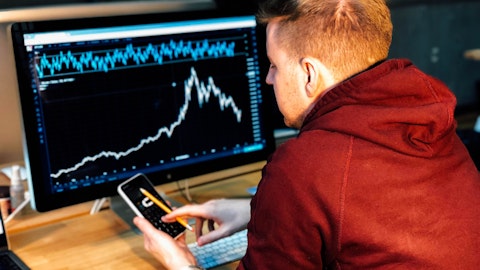Phil Rodoni: Great. Now, again, appreciate the question. So I think, by and large, again, we’re still focused on growing our business organically and doing all that we can do there. And again, the investments that we just mentioned, we’re putting investments in there to actually help us grow organically. We will always be opportunistic in terms of deals that are out there and so we stay connected to the marketplace. And we know folks that are potentially going to be coming on the block. And so we’ll evaluate those as necessary. And if the capital exists with which to do a deal, we’ll pursue it. But again, we’re going to be focused very directly on our plans for our existing organic growth. And again, like I said, we’ll be opportunistic as opportunities arise.
Stephanie Moore: Great. And then, just lastly, on a follow-up to that, in terms of M&A, appreciate the focus on the core business. If you do, kind of looking at what’s out there and maybe this is a more than a 12-month view. Is it software or any kind of maybe on the technology front be attractive to you at M&A? Or kind of still looking on the waste side?
Phil Rodoni: Sure. If you look at just, I appreciate it. If you’ve looked at what we’ve done, historically, we’ve done five deals, I would say over time. The majority of those were books of businesses that we’ve added on to our existing book. But we’ve also made technology acquisitions, as well. And so again, it’s hard to say specifically without talking about a very specific opportunity. But we look across a broad spectrum of potential companies that we look at, whether it be books of business that are interesting to us, specific customer segments that are interesting to us, specific technologies that are interesting to us. So we try and take a wide view when it comes to M&A opportunities. But again, without a very specific example, it’s hard to give any detail. But we’ll take an expansive view of it, for sure.
Stephanie Moore: Got it. Thanks so much.
Operator: And your next question comes from the line of Brett Knoblauch with Cantor Fitzgerald. Your line is open.
Brett Knoblauch: Hi, guys. Thanks for taking my question. Maybe first, if we could just start on the adjusted EBITDA outlook, I think you guys reiterated that you expect to be positive in the fourth quarter. Is that on a month in the fourth quarter, the whole fourth quarter? And if I heard you correctly, is that backing out the non-cash technology expenses?
Phil Rodoni: Yes. Thanks again for the question, Brett. So again, we expect to be profitable, adjusted EBITDA profitable for the fourth quarter overall. And then, obviously, for 2024 – for the full year of 2024. That is including the back out of some non-cash items at the time for Q4.
Brett Knoblauch: Got it. So I guess, the reported adjusted EBITDA number that you’re expecting in the fourth quarter will still be negative. But if we then adjust that adjusted EBITDA number, it would be positive?
Phil Rodoni: That’s right.
Brett Knoblauch: Got it. And then on the balance sheet, how much – I mean, you guys have $13 million of cash. How much available debt capacity do you have to draw down? Because, I guess, free cash flow in the quarter was negative $27 million or so, negative $29 million.
Kevin Schubert: Yeah, thanks. Brett. It’s Kevin. I think we currently have – I think, as we said, I think that was at the end of the quarter, we had about $15 million of cash, but there was some suppressed availability leading to that number. So we actually have a good amount of availability once the sort of suppressed availability from sort of transitioning our – the invoice processing service that we’ve been using. We’ve been transitioning to a new one, which led to a slight compression there. So we have substantial liquidity that we’ll be able to tap into once that suppressed availability comes back. So we’re in a good spot to get us to profitability and beyond. Obviously, to the extent we wanted to do some M&A or things like that, then we’d have to look to likely outside financing, but just to fund the internal operations and are getting to profitability beyond, so that we have the liquidity we need.



